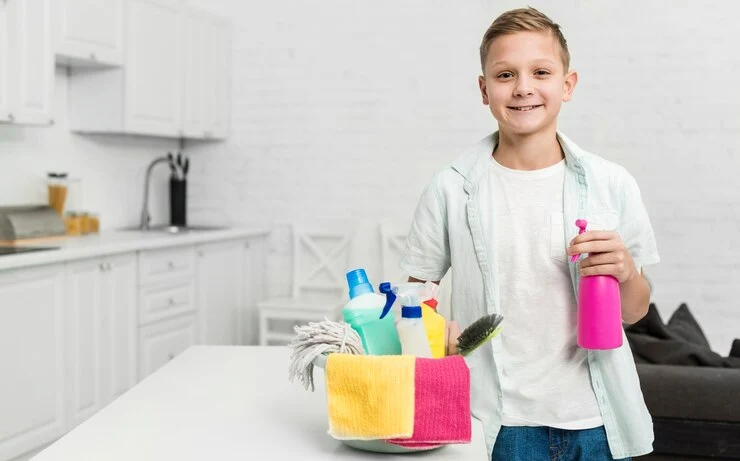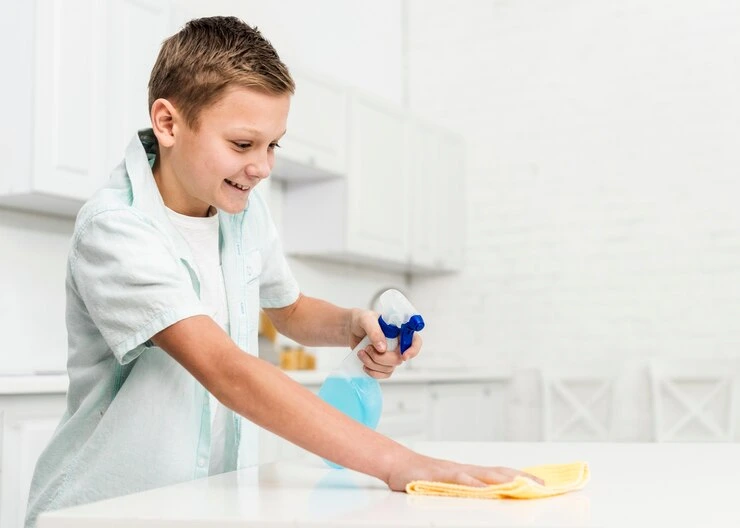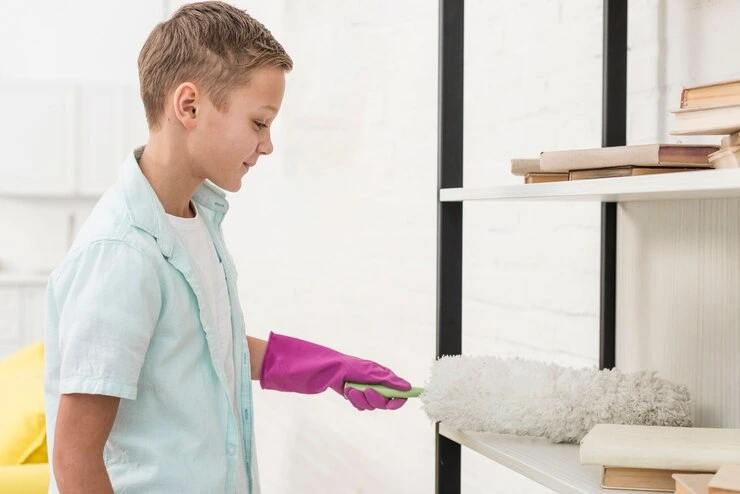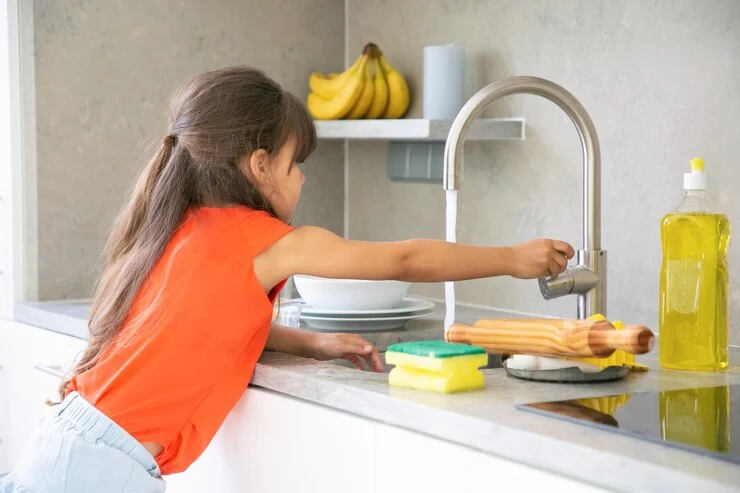Children Cleaning Kitchen
As a parent, I think it’s key to teach kids how to clean the kitchen early on. It should be fun and engaging. Learning to help with kitchen chores is a vital skill that helps them grow up.
Teaching kids to clean the kitchen is more than just tidying up. It’s about teaching them important life skills like hygiene and safety. By involving them in cleaning, we help them build healthy habits for life. In this article, we’ll look at why teaching these skills is important, safety tips, and tasks for kids to start with.
Table of Contents
Introduction to Teaching Children Cleaning Kitchen Skills
I’ll give you a detailed guide on teaching your kids to clean the kitchen safely and well. We’ll cover safety tips, tasks for different ages, and how to make cleaning fun for kids.
Key Takeaways
- Introduce children cleaning kitchen skills at a young age to develop a sense of responsibility and independence
- Teach kids helping with kitchen chores to develop important life skills, such as hygiene and safety
- Make cleaning fun and engaging for kids to encourage participation and develop a strong foundation for healthy habits
- Provide essential safety guidelines to ensure kids’ safety while cleaning the kitchen
- Assign age-appropriate tasks to kids to help them develop their skills and confidence
- Supervise and provide constructive feedback to kids to help them improve their cleaning skills
Why Children Should Learn Kitchen Cleaning Skills
It helps them form habits that last a lifetime. By starting them early, kids learn to be responsible and accountable. Plus, it’s a fun way to bond with your kids.
Some of the key benefits of teaching children kitchen cleaning skills include:
- Developing a sense of responsibility and accountability
- Building life-long habits that will benefit them throughout their lives
- Creating family bonding opportunities that will last a lifetime
Building Life-long Habits
Starting them early teaches them to be responsible and independent. It helps them grow into self-sufficient adults.
Developing Responsibility
Getting kids involved in kitchen cleaning teaches them responsibility. Assigning them tasks helps them feel proud of their work. It boosts their sense of accomplishment.
Creating Family Bonding Opportunities
Children cleaning kitchen is a great way to bond. Working together in the kitchen strengthens family ties. It creates memories that last forever.

Essential Safety Guidelines for Children Cleaning Kitchen Areas
making a safe space for kids to help in the kitchen is key. Before letting them start, teach them about sharp objects, hot surfaces, and electrical appliances. Show them how to hold a knife right, avoid hot stove burners, and plug in appliances correctly.
To keep kids safe and happy while cleaning, follow these important guidelines:
- Always watch over kids while they clean the kitchen to stop accidents.
- Teach them to clean up spills fast to avoid slipping.
- Keep sharp objects and cleaning supplies where kids can’t reach them.
- Make sure kids wash their hands often, after touching raw food or cleaning.
By sticking to these rules, you can make a safe and fun place for kids to clean the kitchen. Always put your child’s safety first and be patient as they learn. With time, kids will get better at helping in the kitchen, gaining skills that will help them for a long time.
Age-Appropriate Kitchen Cleaning Tasks
It’s key to give kids cleaning jobs that fit their age and skills. This keeps them safe and teaches them responsibility. Fun cleaning tasks make the experience enjoyable for them.
As kids grow, they can handle more tasks. Younger ones can start with simple jobs like wiping spills or washing veggies. Older kids can help with loading the dishwasher and setting the table.
Tasks for Different Age Groups
- For ages 3-5: Wipe up spills, wash fruits and vegetables, and help with simple meal preparation
- For ages 6-9: Load the dishwasher, set the table, and assist with cooking and cleaning
- For ages 10-12: Help with meal preparation, clean kitchen counters, and take on more complex cooking tasks
- For teenagers: Prepare meals, deep clean the kitchen, and take on more significant responsibilities
Assigning the right cleaning tasks and making them fun helps kids develop good habits. This leads to a more cooperative home where everyone helps keep the kitchen clean.
Making Children Cleaning Kitchen Activities Fun and Engaging
To keep kids excited about helping with kitchen chores, make it fun. Add enjoyable activities to their daily routine. This way, helping in the kitchen becomes a positive experience for everyone.
There are many ways to make cleaning fun for kids. Try creating games like a “cleaning scavenger hunt” or “kitchen cleaning relay.” You can also use rewards like stickers or stars to motivate them.
Creating a Positive Cleaning Environment
Setting up cleaning challenges can make it more exciting. Here are some tips for a positive cleaning space:
- Play music while cleaning to make it more enjoyable
- Use colorful cleaning tools and supplies to add a pop of color to the task
- Make it a team effort by working together with your kids to complete the task
Making it a Routine
Make fun kitchen cleaning activities a part of their daily routine. This helps keep the kitchen clean and teaches kids important skills. With a bit of creativity, cleaning can be a fun activity for the whole family.
Teaching Proper Kitchen Hygiene Habits
To teach kids about kitchen hygiene. This ensures they know the importance of keeping the kitchen clean and safe. Start with the basics like washing hands right and cleaning up spills fast. This stops bacteria and germs, making the kitchen safe for everyone.
It’s also important for kids to clean kitchen surfaces, utensils, and equipment. Teach them to use soap and water well and how to sanitize to avoid germs spreading. This helps kids feel responsible and independent in the kitchen.
Some key habits to teach kids include:
- Washing hands with soap and water before and after handling food
- Cleaning up spills and messes immediately to prevent slips and falls
- Sanitizing kitchen surfaces and equipment to prevent the spread of bacteria and germs
- Properly storing food and utensils to prevent cross-contamination
By teaching these habits, parents help kids value cleanliness and safety in the kitchen. This makes cleaning up easier and mealtime more fun for everyone.

Supervision Strategies and Parent Guidelines
it’s key to watch over your kids when they help with kitchen tasks. This ensures their safety and helps them learn. Teaching kids to clean the kitchen is a great way to teach them life skills, but you need to guide them well.
To create a safe space, set up a “kid-friendly” area in the kitchen. This spot should be where your child can work safely. Make sure sharp objects and hot surfaces are not within their reach. This way, you prevent accidents and make cleaning fun for them.
Creating Safe Boundaries
- Designate a kid-friendly zone in the kitchen
- Ensure sharp objects and hot surfaces are out of reach
- Supervise your child at all times while they’re helping with kitchen chores
Monitoring Progress and Offering Feedback
As your child gets better at helping, watch their progress and give feedback. This keeps them motivated and improves their skills. Positive feedback and guidance help your child develop a strong work ethic and sense of responsibility.
Conclusion: Empowering Kids Through Kitchen Responsibilities
Teaching kids how to clean the kitchen is a key life lesson. It makes them feel responsible and confident. By getting kids involved in keeping the kitchen clean, parents can teach them valuable habits. This also helps families bond.
Kitchen cleaning tasks can be made fun and suitable for different ages. This makes learning fun and relevant for kids.
Teaching kids about kitchen hygiene and cleaning skills prepares them for the future. It teaches them to be accountable and solve problems. These skills are important for their future.
Also, cleaning together strengthens the bond between parents and kids. It creates lasting memories and shows the value of a clean home.
Teaching kids to take care of the kitchen is a lasting gift. By following this guide, parents can teach their kids important skills. These skills help kids feel proud and develop healthy habits for life.
Let’s give our kids the chance to grow into responsible, self-sufficient adults. They will take pride in keeping their kitchen clean and organized.

FAQ – Children Cleaning Kitchen
Why should children learn kitchen cleaning skills?
Teaching kids to clean the kitchen is key for many reasons. It helps them develop habits that last a lifetime. It also teaches them responsibility and strengthens family bonds.
By starting early, kids learn to take care of their space. This skill is valuable for their future.
What are the essential safety guidelines for children cleaning kitchen areas?
Before kids start cleaning, it’s vital to teach them safety first. They need to know how to handle sharp objects and hot surfaces. They should also learn about electrical appliances and how to clean up spills quickly.
What are the age-appropriate kitchen cleaning tasks for children?
It’s important to match cleaning tasks with a child’s age. Young kids (ages 3-5) can start with simple tasks like wiping spills and washing veggies. As they grow (ages 6-9), they can help with loading the dishwasher and setting the table.
Pre-teens (ages 10-12) can take on more tasks like cooking and cleaning counters. Teenagers can handle even more, like preparing meals and deep cleaning the kitchen.
How can I make children’s kitchen cleaning activities fun and engaging?
To keep kids interested in cleaning, make it fun. Try creating cleaning games or using rewards. Setting up challenges can also add excitement to the task.
This approach keeps kids eager to help out in the kitchen.
Why is teaching proper kitchen hygiene habits important?
It shows them the importance of cleanliness and safety. They should learn to wash hands properly and clean up spills quickly.
They also need to know how to handle food safely. And how to clean and sanitize kitchen surfaces and tools.
How can I effectively supervise my children while they help with kitchen chores?
Supervising kids while they clean is key for their safety and success. Set clear boundaries and watch their progress. Offer feedback to help them improve.
This approach keeps kids motivated and helps them become better at cleaning. It also keeps the kitchen safe and clean.
What age should kids start cleaning the kitchen?
Children can start as young as two years old with simple tasks like wiping surfaces and throwing away trash. As they grow, they can take on more responsibility.
What can children learn from cleaning?
Cleaning teaches kids responsibility, hygiene, organization, and teamwork. It also helps them develop independence and life skills that will serve them well into adulthood.
How do I teach my child kitchen safety?
Start with basic safety rules, such as washing hands, avoiding sharp objects, and staying away from hot surfaces. Supervise them closely and introduce new tasks gradually.
By involving children in kitchen cleaning from an early age, we’re setting them up for success. Let’s teach them the value of a clean, safe home—one small task at a time!

